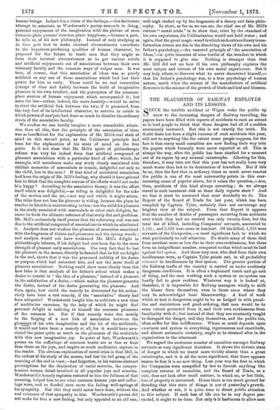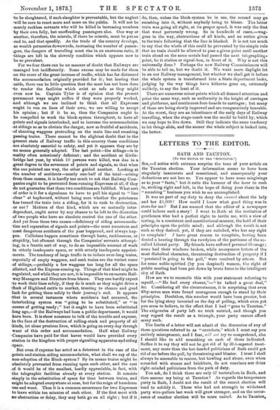THE SLAUGHTER OF RAILWAY EMPLOYES AND ITS LESSONS.
SINCE the terrible accident at Wigan woke the public up anew to the increasing dangers of Railway travelling, the papers have been filled with reports of accidents to such an extent as to lead people to think that these dangers had all of a sudden enormously increased. But this is not exactly the truth. No doubt there has been a slight increase of such accidents this year, still not to anything like the extent some people suppose, for the fact is that many small casualties are now finding their way into the papers which formerly were never reported at all. This is always the way, after the public has been startled for a moment out of its repose by any unusual catastrophe. Allowing for this, therefore, it may turn out that this year has not really been very much worse than last in its destruction of travellers. But if this be so, then the fact that in ordinary times so much never reaches the public is one of the most noteworthy points in this ever- recurring cause of popular alarm, for it raises the question,—Are, then, accidents of this kind always occurring ; do we always travel in such imminent risk as these daily reports show ? And we fear it must be answered that most decidedly we do. The Report of the Board of Trade for last year, which has been compiled by Captain Tyler, certainly does not encourage any brighter view of the subject. From that Report it appears that the number of deaths of passengers occurring from accidents over which they had no control was only twenty-four, but the total list of killed, including Companies' servants, amounted to 1,145; and 3,038 were more or less.hurt. Of the killed, 1,018 were servants of the Companies,—a most significant fact, to which'we wish particularly to call attention. No doubt many of these died from accident more or less due to their own recklessness, but these form an insignificant number, compared to that which must be laid against bad system. And those very men who died from their own heedlessness were, as Captain Tyler points out, in all probability educated to heedlessness by that system. The greater portion of the Railway traffic of the country is carried on under needlessly dangerous conditions. It is often a haphazard touch-and-go sort of thing, and the men working such a system or no-system can hardly fail to grow reckless. Whatever way it is looked at, therefore, it is impossible for Railway managers wholly to shift the blame from themselves, even in those cases where they may be acknowledged least blameworthy. A kind of work which at best is dangerous ought to be so hedged in with penal- ties and restrictions and good-ordering, that men would be to some extent protected from it, and their own recklessness from familiarity with it ; but instead of that, they are constantly taught to disregard the danger, and they themselves, and the public too, often suffer for this indifference. Where so much depends upon exactness and system in everything, rigorousness and exactitude, and almost automatic certainty, ought to be strained after in the organisation to the uttermost.
We regard the enormous number of casualties amongst Railway servants as very significant therefore. It shows the chronic state of danger in which we travel more vividly almost than a great catastrophe, and it is all the more significant, that there appears reason to fear it is no new thing. Last year was the first in which the Companies were compelled by law to furnish anything like
complete returns of casualties, and the Board of Trade, as a rule, does not look after small matters, in which no, or but little,
loss of property is concerned. Hence there is too much ground for dreading that this state of things is not of yesterday's growth. And whether or not, it is quite time to direct public attention
to this subject. If such loss of life can be in any degree pre- vented, it ought to be done. Not only is it barbarous to allow men You ask, do I think there are only 57 teetotallers in Bath, and then assume my being at Taunton? As regards the temperance party in Bath, I doubt not the result of the recent election will tend to solidify it. Those who had not strength to withstand party wire-pullers last week will grow stronger, and on the occur- r* obstruction or delay, they may both go on all right ; but if it rence of another election will be more united. As to Taunton,
to be slaughtered, if such slaughter is preventable, but the neglect will be sure to react more and more on the public. It will not be merely reckless servants who will be killed in increasing numbers by their own folly, but unoffending passengers also. One way or another, therefore, the misrule, if there be misrule, must be put an -end to, and that speedily. As the trade of the country develops, as wealth permeates downwards, increasing the number of passen- gers, the dangers of travelling must rise in an enormous ratio, if things are left in the slovenly condition which appears now to 'be so prevalent.
For we fear there can be no manner of doubt that Railways are managed but indifferently. Some excuse may be made for them -on the score of the great increase of traffic, which has far distanced the accommodation originally provided for it ; but leaving that aside, there can be little question that the most has not been done to render the facilities which exist as safe as they might -even now be. Captain Tyler is of opinion that the present 'permanent ways might suffice if they were properly worked, and although we are inclined to think that all Expresses -ought to run on lines of their own, we are willing to accept his opinion ; but if it be so, then the Companies ought to be compelled to work the block-system throughout, to have all points and signals interlocked, and to increase the accommodation at sidings so as to obviate the danger, now so fruitful of accidents, -of shunting waggons protruding on the main line and smashing passing trains. There cannot be the slightest doubt that in the present state of Railway traffic in this country these conditions *re absolutely essential to safety, and yet it appears they are by co means generally adopted. The last point—the sidings—is in 'reality often notoriously deficient ; and the accident at Kirtle- %ridge last year, by which 10 persona were killed, was due in a /rest degree to the severance of points and signals, so that when the one pointed one way, the other guided another. Looking at the number of accidents—nearly one-half of the total—arising from these causes, it is hardly too much to ask that Railway Com- panies ought to be prevented from running Expresses at all, if they do not guarantee that these two conditions are fulfilled. What sort of order is it for a signalman to have to pull his signal to "line -clear" at haphazard, without being sure whether the pointsman tea turned the train into a siding, for it to rush to destruction, -or not? Matters of that kind, which are so mutually inter- dependent, ought never by any chance to be left to the discretion -of two people who have no absolute control the one of the other. And yet from these two causes—deficiency of siding accommoda- tion and separation of signals and points—the most numerous and mast dangerous accidents of the year happened, and always hap- pen. Collisions happen sometimes through baste, recklessness, or -stupidity, but oftenest through the Companies' servants attempt- 'lug, in a frantic sort of way, to do an impossible amount of work in utterly inadequate space, or with utterly inadequate appoint- anents. The tendency of large traffic is to induce over-long trains, -especially of empty waggons, and such trains are the veriest curse -of sidings,—probably a few waggons too long for all the space allotted, and the Express coming up. Things of that kind might be 'regulated, and while they are not, it is impossible to exonerate Rail- way Managers and Directors from blame. They can hardly expect to work their lines safely, if they do it much as they might drive a chock of Highland cattle to market, trusting to chance and good 'luck for getting them safely to their journey's end. It appears that in several instances where accidents had occurred, the -interlocking system was "going to be substituted," or "in -course of getting ready;" but it ought to have been substituted -long ago,—if the Railways had been a public department, it would have been. It is sheer nonsense to talk of the trouble and expense, in the face of the destruction of rolling-stock and property of all 'kinds, let alone precious lives, which is going on every day through want of this order and accommodation. Half what Railway 'Companies have paid for that havoc would have provided every -station in the kingdom with proper signalling apparatus and siding apace.
But even if expense has acted as a deterrent in the case of the points and station-siding accommodation, what shall we say of the con-adoption of the Block-system? By its means trains might be absolutely prevented from running upon each other, and the cost of it would be of the smallest, hardly appreciable, in fact, with the telegraphic facilities already at every station. It consists simply in the substitution of space for time between trains, and might be adopted everywhere at once, but for the reign of humdrum we and wont. Thus it is a common occurrence for two Expresses to leave within ten minutes of each other. If the first meet with
do, then, unless the block-system be in use, the second may go smashing into it, without anybody being to blame. The latter train was going all right, at its proper speed, it was only the first that went perversely wrong. So in hundreds of cases,—wag- gons in the way, obstructions of all kinds, and no notice given to the train following that the line is blocked. It is not too much to say that the whole of this could be prevented by the simple rule that no train should be allowed to pass a given point until another train ahead on the same metals had passed the next telegraphing- point, be it station or signal-box, in front of it. Why is not this universally done ? Perhaps the new Railway Commissioners will be able to tell us, but we doubt it. We want more daylight let in on our Railway management, but whether we shall get it before the whole system is transformed into a State department looks, judging by the way things have hitherto gone on, extremely unlikely, to say the least of it.
There are numerous minor points which all demand attention and point the same way, such as uniformity in the height of carriages and platforms, end continuous foot-boards to carriages ; but many of these are being slowly improved and are comparatively bearable. At the worst, they are an inheritance of the early days of Railway travelling, when the stage-coach was the model to build by, which we may hope to live down. Still they indicate the same tendency to let things slide, and the sooner the whole subject is looked into, the better.



































 Previous page
Previous page